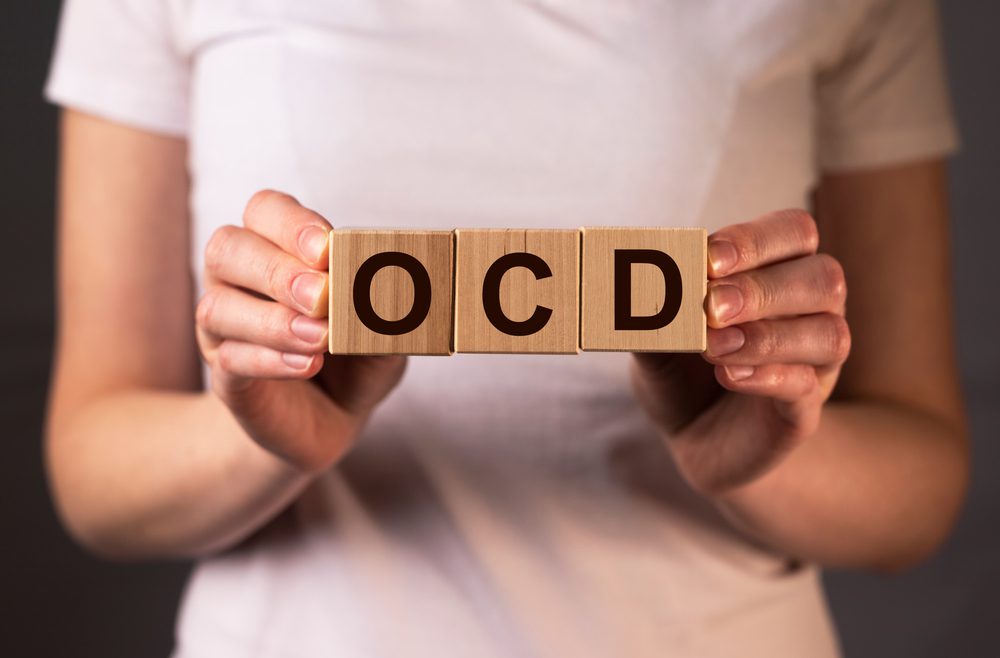…Have you ever heard about obsessive-compulsive disorder, also simply known as OCD?
You’ve surely met a perfectionist who has their wardrobe organized by color scheme, someone who needs to get the Christmas tree ready in a specific way, otherwise it’s a waste of time, or a germaphobe who has a stockpile of hand sanitizer wherever they are.
You might think that these people are fixated on their habits and don’t want to lose control. But truth be told, this is OCD doing its job. Obsessive-compulsive disorder (OCD) is a kind of anxiety that makes people act in a specific way, and it’s not easy at all.
However, these kinds of peculiarities do not always indicate that someone might have this type of mental health issue. According to Alison Dotson, president of OCD Twin Cities in Minneapolis, an affiliate of the International OCD Foundation, one of the worst things about this issue is that people don’t understand it.
In her book, “Being Me With OCD: How I Learned to Obsess Less and Live My Life,” she stated that she has dealt with OCD for much of her life and claims that most people aren’t trying to be hurtful when they express ignorance about the illness.
But there’s one thing the author is mad about: when someone says that they have OCD, some people respond that it’s not that big of a deal. Well, it actually is, and it’s way harder to live with than it seems at first. Speaking of that, here are a few facts to keep in mind about this kind of mental illness:

1. OCD is a sort of anxiety (not psychosis)
Even though those with OCD often have intrusive, repetitive thoughts, they do not, in contrast to those with schizophrenia, become detached from reality. They know what’s actually happening and what’s going on inside their heads, but they can’t stop it.
Some people who have obsessive-compulsive disorder are scared that they might cause harm to themselves or to the people they love, or they might feel like all the things in their pantry must be organized so that they can see the brand name when they open the door. Even the fear of leaving the stove on (even though you checked it multiple times) is a sign of OCD.
2. Many people keep it a secret
According to research, people who suffer from this mental disorder don’t want others to know about it, so they become experts at keeping their symptoms hidden.
In fact, in accordance with the International OCD Foundation, it might take 14–17 years from the beginning of symptoms for a person with OCD to get treatment.
One reason why patients tend to conceal their symptoms from family and coworkers is that they feel embarrassed about what they’re doing and believe they’re the only ones who are doing these things.
Excessive hand washing, bathing, or the use of paper products like paper towels and toilet paper might be symptoms of obsessive-compulsive disorder, as experts say, especially if the individual doing them looks upset.
3. OCD is a type of mental disorder
The American Psychiatric Association says that people with this type of mental disorder are ruled by repeated, unpleasant thoughts, ideas, or feelings (obsessions) that force them to repeat an action again and again (compulsions).
Repeated actions can be very bad for a person’s ability to function in everyday life and keep relationships with other people.
I remember that when I was a kid and there was a test coming up at school, a few days prior to it, my mind was acting crazy. I had all sorts of weird thoughts, like “If I don’t do the dishes, I’ll fail the test,” or “If I don’t lock the door three times, the test will be hard, and I will fail”.
I know it might seem like it was just a little bit of stress, but each time something important came up, my mind was acting this way. After some time, it was better because I realized what I was doing and was telling myself to stop and think of something different. Eventually, I succeeded, but it was hard.
Science says that obsessions are unwanted, repeated thoughts, urges, or desires that a person tries to ignore or push away but can’t, and that’s the hardest part of this illness.
It’s common for someone with OCD to feel that they need to do rituals endlessly; this is called compulsion. Patients who don’t follow through on them could have severe panic attacks if they keep thinking about the possibility that they won’t succeed.
To put it in simpler words, this mental illness is a condition of catastrophic overreaction to normal ideas. Those who suffer from it are more likely to be late in various places because they must return home and check (again) if everything is okay, such as making sure the door is shut and locked.
Furthermore, because they were so terrified that they didn’t leave things in order when they left, these people feel safer when they have someone with them to double-check. When their minds start wondering if they did something or not, they have their friends to assure them that everything is right.

4. It affects both kids and adults
The National Institute of Mental Health reports that OCD is usually identified by the age of 19, and it affects younger men more than women. However, females can experience OCD shortly after giving birth, probably as a post-partum side effect.
According to experts, OCD can affect even very young children. But on the other hand, kids can have a lot of ritualistic behaviors and routines that are very soothing to them but do not necessarily mean they have an obsessive-compulsive disorder.
5. It can run in families
As the National Institute of Mental Health says, multiple regions of the brain are implicated in obsessive thinking, compulsive behavior, and phobias. Even though researchers have yet to pinpoint a specific cause for OCD, they suspect genetics play a role.
That might be because when they’re little, kids adopt the behaviors of their parents, doing or saying the same things they notice adults do. So if one of the parents, if not both, already has a problem with OCD, it might develop in the child too.
6. It can be affected by life events
You sure know that the things that happen in your personal life might be very harmful to your health, which is why it’s best to relax as much as possible and avoid stress.
Speaking of this, different studies have found that stressful events like a family member being hospitalized, a serious personal illness, or the loss of something very important were all linked to an increase in OCD symptoms, especially in women.
7. OCD can come with other disorders
The National Institute of Mental Health says that OCD is often accompanied by anxiety, sadness, and body dysmorphic disorder, which causes people to have irrational fears and beliefs about how they look.
Different doctors say that about 2/3 of the people who have OCD will people suffer from serious depression at some time in their life. So if you ever feel like you have all sorts of thoughts and behaviors, you should call your doctor and tell them how you feel and what you think. This is the only way you could receive the advice and help you need.
8. It’s more than a hygiene obsession
According to different sources, the obsessions of those who suffer from OCD are quite diverse. Some individuals have a real aversion to germs and other forms of body fluids, and as a result, they might feel the need to wash their hands or take long, hot showers every day.
Other people, on the other hand, worry about being powerless, hurting others, or sick. These are all valid examples of OCD signs and symptoms, and as we’ve told you, they are different for everyone.
Perfectionism is a factor in certain obsessive behaviors, such as the need to keep everything in perfect balance or the ritualization of actions that aim for symmetry. Certain individuals might have irrational beliefs based on superstition.
9. More than a hand-washing obsession
People with OCD might feel the need to think or act in ritualistic ways to try to ease the stress that their obsessions cause.
For example, regular hand washing might help you forget for a while about your hygiene concerns. Tapping one’s fingers 3 times, doing something 3 times, or checking and rechecking something are all examples of rituals that some individuals adopt.
…Did you know that there are more than 55 million people diagnosed with dementia in the world? Check out this article to discover more: 7 Worst Types of Dementia and How to Identify Yours!















One Response
Yes, those are all correct, I have OCD, not crazy but OCD. I tried to hide mine as well. It happened to embarress me alot of time and i didn’t even realize what i was doing until someone what mocking me and calling me crazy, which is wrong OCD doesn’t mean your crazy. i put my clothes up in color coding, i have to have every thing the way that makes me feel comfortable not the way someone else wants it. i have to have my closet door closed because it will aggrivate me until i slam the door closed. i know if someone has used my things and want to know who didn’t put it back the way it should be i have three outfits for each day of the week, my panties and bra must match the outfit i wear and i will only wear three pairs of shoe my timberlands, sketchers and on sunday my dress shoes black boots with two inch heels nothing else, if i don’t have the right shirt to wear with my monday jeans then i’m not leaving the house. my house is always the same way i can’t stand it when someone move a pillow or blanket i will put it back my tooth brush is always purple with a purple case i change it every three months or after being sick i keep sanitizer everywhere. after i was my hands in hot water and antibacterial soap and dry them i put the hand towel in the hamper and sanitize my hands. nothing changes everything stays in the order that i have it. its not easy like people think, it wares me out a lot of time arguing over where something goes and where it doesn’t i know if someone uses my toothpaste or my make up, my clothes hamper never goes over two outfits and two towels with one gown, all of my night gown must be white or i don’t touch them, i wear latex gloves before i do my own laundry in my own washer, its not fun. i tie my shoes three times in a row then untie the knots and the fourth time i tie it and leave after brushing my hair 100 time exactly and brushing my teeth with gloves on three times. tell me how you might think that is for someone, i am a woman and my father and older brother have the same thing,